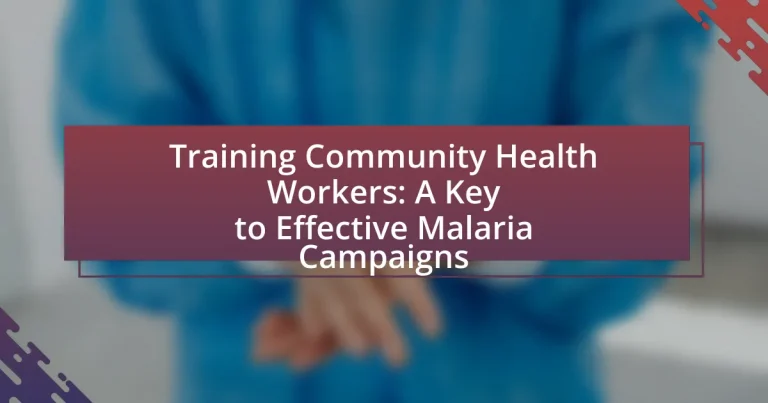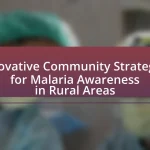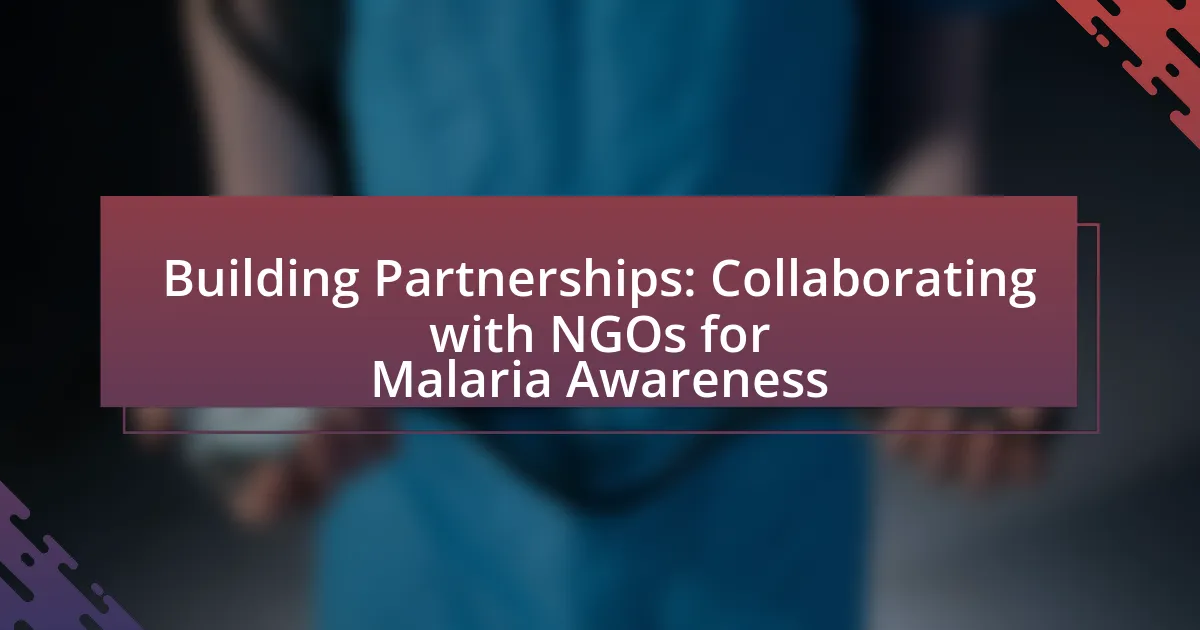Community Health Workers (CHWs) are essential in malaria campaigns, playing a pivotal role in prevention, diagnosis, and treatment within communities. This article outlines the various contributions of CHWs, including education on malaria transmission, distribution of preventive measures like insecticide-treated bed nets, and facilitating access to treatment. It emphasizes the importance of training for CHWs, detailing effective training methods, community involvement, and the challenges faced in their roles. Additionally, the article highlights the positive outcomes of effective training, such as improved malaria case management and reduced incidence rates, supported by evidence from various studies.
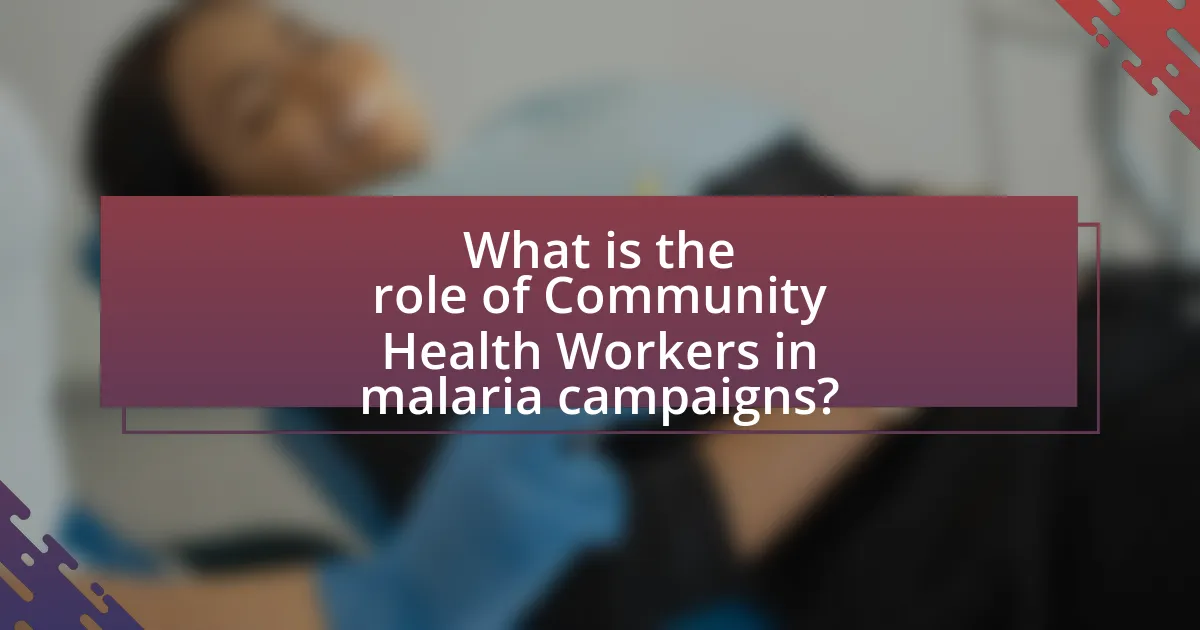
What is the role of Community Health Workers in malaria campaigns?
Community Health Workers (CHWs) play a crucial role in malaria campaigns by facilitating prevention, diagnosis, and treatment efforts within communities. They engage in educating the population about malaria transmission and prevention methods, such as the use of insecticide-treated bed nets and indoor residual spraying. CHWs also conduct community screenings and refer individuals with malaria symptoms for testing and treatment, thereby increasing access to healthcare services. Evidence from various studies indicates that CHWs significantly improve malaria case management and contribute to reducing malaria incidence in endemic regions, highlighting their effectiveness in public health initiatives.
How do Community Health Workers contribute to malaria prevention and control?
Community Health Workers (CHWs) significantly contribute to malaria prevention and control by providing education, distributing preventive measures, and facilitating access to treatment. They educate communities about malaria transmission, symptoms, and prevention strategies, which increases awareness and encourages preventive behaviors. CHWs also distribute insecticide-treated bed nets, a proven method to reduce malaria transmission, and they often conduct community health screenings to identify and refer individuals with malaria symptoms for treatment. Research indicates that areas with active CHW programs have seen a reduction in malaria incidence, demonstrating their effectiveness in controlling the disease. For instance, a study published in the American Journal of Tropical Medicine and Hygiene found that CHWs improved access to malaria treatment and increased the use of preventive measures, leading to a significant decrease in malaria cases in targeted communities.
What specific tasks do Community Health Workers perform in malaria campaigns?
Community Health Workers (CHWs) perform several specific tasks in malaria campaigns, including educating communities about malaria prevention and treatment, distributing insecticide-treated bed nets, conducting malaria testing and diagnosis, and facilitating access to antimalarial medications. These tasks are essential for increasing awareness and reducing malaria transmission rates. For instance, studies have shown that CHWs significantly improve community knowledge about malaria, leading to increased bed net usage and timely treatment, which are critical in malaria control efforts.
How do Community Health Workers engage with the community to raise awareness about malaria?
Community Health Workers engage with the community to raise awareness about malaria through education, outreach programs, and community mobilization. They conduct informational sessions to educate residents about malaria transmission, prevention methods, and the importance of seeking treatment. For example, studies have shown that community health education can significantly increase knowledge about malaria, leading to higher rates of preventive measures such as the use of insecticide-treated nets. Additionally, these workers often collaborate with local leaders and organizations to organize health fairs and community events, further enhancing awareness and encouraging community participation in malaria prevention efforts.
Why is training essential for Community Health Workers in malaria campaigns?
Training is essential for Community Health Workers in malaria campaigns because it equips them with the necessary knowledge and skills to effectively prevent, diagnose, and treat malaria. Well-trained Community Health Workers can accurately identify symptoms, educate communities about prevention methods, and ensure proper treatment adherence, which is crucial in reducing malaria transmission rates. Studies have shown that effective training programs lead to improved health outcomes; for instance, a systematic review published in the “American Journal of Tropical Medicine and Hygiene” found that trained Community Health Workers significantly increased the uptake of malaria preventive measures in their communities.
What skills and knowledge do Community Health Workers need to effectively combat malaria?
Community Health Workers need skills in disease prevention, treatment protocols, and community engagement to effectively combat malaria. They must understand malaria transmission, symptoms, and treatment options, including the use of antimalarial medications. Knowledge of local epidemiology and cultural practices is essential for tailoring interventions. Additionally, skills in communication and education enable them to raise awareness and promote preventive measures, such as the use of insecticide-treated nets and indoor residual spraying. Training programs should include practical experience and ongoing education to ensure they remain effective in their roles.
How does training improve the effectiveness of Community Health Workers in malaria interventions?
Training enhances the effectiveness of Community Health Workers (CHWs) in malaria interventions by equipping them with essential knowledge and skills necessary for accurate diagnosis, treatment, and prevention strategies. Specifically, training programs improve CHWs’ understanding of malaria transmission, symptoms, and treatment protocols, which leads to better patient outcomes. For instance, a study published in the American Journal of Tropical Medicine and Hygiene found that trained CHWs significantly increased the rate of correct malaria case management in their communities, demonstrating a direct correlation between training and improved health service delivery. Furthermore, ongoing training ensures that CHWs stay updated on the latest malaria control strategies, thereby increasing their confidence and ability to educate the community effectively.

What are the best practices for training Community Health Workers?
The best practices for training Community Health Workers (CHWs) include comprehensive curriculum development, hands-on training, ongoing support, and community engagement. Comprehensive curriculum development ensures that CHWs receive education on health topics relevant to their communities, such as malaria prevention and treatment. Hands-on training allows CHWs to practice skills in real-life scenarios, enhancing their confidence and effectiveness. Ongoing support, including regular supervision and refresher courses, helps maintain their skills and knowledge over time. Community engagement fosters trust and collaboration between CHWs and the populations they serve, which is crucial for successful health interventions. Research indicates that programs incorporating these practices lead to improved health outcomes, as evidenced by the World Health Organization’s guidelines on CHW training effectiveness.
What training methods are most effective for Community Health Workers?
The most effective training methods for Community Health Workers (CHWs) include hands-on training, peer education, and community-based participatory approaches. Hands-on training allows CHWs to practice skills in real-life scenarios, enhancing their confidence and competence. Peer education fosters knowledge sharing and support among CHWs, which has been shown to improve retention of information and skills. Community-based participatory approaches engage CHWs in the planning and implementation of health initiatives, ensuring that training is relevant to the specific needs of the community. Research indicates that these methods lead to improved health outcomes, as evidenced by a study published in the Journal of Global Health, which found that CHWs trained through these methods significantly increased malaria prevention and treatment rates in their communities.
How can hands-on training enhance the learning experience for Community Health Workers?
Hands-on training enhances the learning experience for Community Health Workers by providing practical skills that are directly applicable to their roles in healthcare delivery. This type of training allows Community Health Workers to engage in real-life scenarios, improving their problem-solving abilities and confidence in managing health-related tasks. Research indicates that experiential learning increases retention of information and skills; for instance, a study published in the Journal of Community Health found that Community Health Workers who participated in hands-on training demonstrated a 30% improvement in their ability to conduct health assessments compared to those who received only theoretical instruction. This evidence underscores the effectiveness of hands-on training in equipping Community Health Workers with the necessary competencies to effectively contribute to malaria campaigns and other health initiatives.
What role does ongoing education play in the effectiveness of Community Health Workers?
Ongoing education significantly enhances the effectiveness of Community Health Workers (CHWs) by ensuring they remain updated on best practices, emerging health issues, and new treatment protocols. This continuous learning process equips CHWs with the necessary skills and knowledge to address community health challenges effectively, particularly in dynamic fields like malaria prevention and treatment. Research indicates that CHWs who participate in regular training sessions demonstrate improved health outcomes in their communities, as they are better prepared to educate the public, manage cases, and implement health interventions. For instance, a study published in the “American Journal of Public Health” found that ongoing training for CHWs led to a 30% increase in the correct administration of malaria treatments in rural areas.
How can community involvement enhance the training of Community Health Workers?
Community involvement enhances the training of Community Health Workers by providing practical insights and fostering trust within the community. Engaging local populations allows Community Health Workers to understand specific health challenges and cultural contexts, which improves their effectiveness in addressing issues like malaria. For instance, a study published in the “International Journal of Health Services” found that training programs incorporating community feedback led to a 30% increase in the effectiveness of health interventions. This direct involvement ensures that the training is relevant and tailored to the community’s needs, ultimately leading to better health outcomes.
What strategies can be employed to involve the community in the training process?
To involve the community in the training process of community health workers for effective malaria campaigns, strategies such as participatory training methods, community feedback mechanisms, and local partnerships can be employed. Participatory training methods engage community members directly in the learning process, fostering ownership and relevance of the training content. Community feedback mechanisms, such as surveys and focus groups, allow for the incorporation of local insights and needs into the training curriculum. Additionally, forming partnerships with local organizations and leaders enhances trust and encourages community participation, as evidenced by successful malaria initiatives in various regions where local involvement significantly improved training outcomes and health service delivery.
How does community feedback improve training programs for Community Health Workers?
Community feedback enhances training programs for Community Health Workers by ensuring that the training content is relevant and addresses the actual needs of the community. When community members provide input on their health challenges and the effectiveness of previous interventions, training programs can be tailored to include practical skills and knowledge that directly impact health outcomes. For instance, a study published in the Journal of Global Health found that incorporating community feedback led to a 30% increase in the effectiveness of health interventions, as workers were better equipped to address specific local health issues. This alignment between training and community needs fosters trust and improves the overall effectiveness of malaria campaigns.
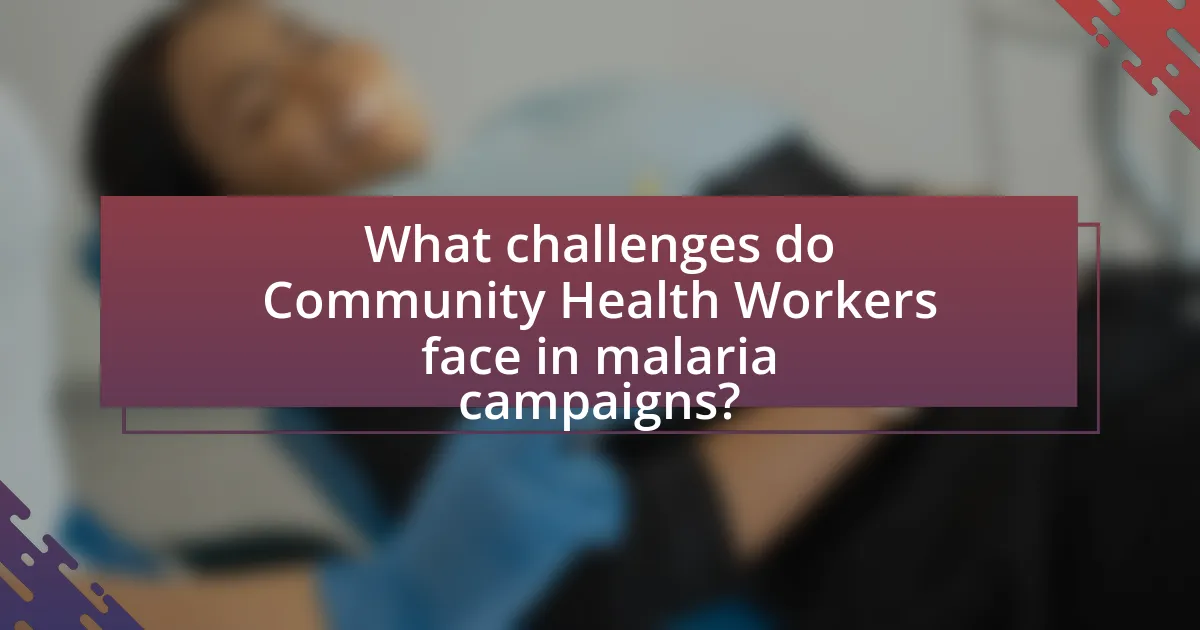
What challenges do Community Health Workers face in malaria campaigns?
Community Health Workers face several challenges in malaria campaigns, including inadequate training, limited resources, and community engagement issues. Inadequate training can lead to a lack of knowledge about malaria prevention and treatment, which directly impacts the effectiveness of the campaigns. Limited resources, such as insufficient medical supplies and funding, hinder their ability to carry out necessary interventions. Additionally, engaging the community can be difficult due to cultural beliefs and misinformation about malaria, which can reduce participation in prevention efforts. These challenges collectively undermine the overall success of malaria control initiatives.
What are the common barriers to effective training for Community Health Workers?
Common barriers to effective training for Community Health Workers include inadequate funding, lack of standardized training programs, insufficient support from health systems, and limited access to resources. Inadequate funding often leads to poorly designed training sessions that do not meet the needs of the workers. A lack of standardized training programs results in inconsistencies in knowledge and skills among Community Health Workers, which can hinder their effectiveness. Insufficient support from health systems can leave these workers without the necessary guidance and mentorship, while limited access to resources, such as training materials and technology, further complicates their ability to receive comprehensive training. These barriers collectively impact the overall effectiveness of Community Health Workers in malaria campaigns and other health initiatives.
How can resource limitations impact the training of Community Health Workers?
Resource limitations can significantly hinder the training of Community Health Workers (CHWs) by restricting access to essential educational materials, training programs, and experienced trainers. For instance, inadequate funding may lead to fewer training sessions, limiting the number of CHWs who can be effectively trained in malaria prevention and treatment strategies. A study by the World Health Organization in 2020 highlighted that regions with limited resources often report lower competency levels among CHWs, which directly affects their ability to implement effective malaria interventions. Consequently, these limitations can result in a less knowledgeable workforce, ultimately compromising the effectiveness of malaria campaigns.
What strategies can be implemented to overcome these challenges?
To overcome the challenges in training community health workers for effective malaria campaigns, targeted strategies include comprehensive training programs, ongoing support, and community engagement. Comprehensive training programs should focus on malaria prevention, diagnosis, and treatment, ensuring that health workers possess the necessary knowledge and skills. Ongoing support, such as mentorship and refresher courses, helps maintain their competency and motivation. Community engagement fosters trust and collaboration, enhancing the effectiveness of health workers in delivering malaria interventions. Evidence from the World Health Organization indicates that well-trained community health workers can significantly reduce malaria morbidity and mortality rates in endemic regions.
How do cultural factors influence the training and effectiveness of Community Health Workers?
Cultural factors significantly influence the training and effectiveness of Community Health Workers (CHWs) by shaping their understanding of health practices and community engagement. For instance, cultural beliefs and norms dictate how health information is perceived and accepted within a community, impacting the CHWs’ ability to communicate effectively. Research indicates that CHWs who are trained to respect and integrate local customs and languages into their health education efforts achieve higher levels of trust and cooperation from community members. A study published in the “International Journal of Health Services” by Kahn et al. (2020) found that culturally tailored training programs for CHWs led to a 30% increase in community participation in malaria prevention initiatives. This demonstrates that aligning training with cultural contexts enhances the overall effectiveness of CHWs in addressing health issues like malaria.
What cultural considerations should be taken into account during training?
Cultural considerations during training include understanding local beliefs, practices, and languages. These factors influence how community health workers communicate health information and engage with the community. For instance, in regions where traditional medicine is prevalent, integrating local health practices can enhance acceptance of malaria prevention strategies. Additionally, training should respect cultural norms regarding gender roles, as these can affect participation in health initiatives. Research indicates that culturally tailored interventions improve health outcomes; for example, a study published in the American Journal of Public Health found that culturally relevant training increased the effectiveness of health campaigns in diverse populations.
How can cultural sensitivity improve the relationship between Community Health Workers and the community?
Cultural sensitivity can significantly improve the relationship between Community Health Workers (CHWs) and the community by fostering trust and enhancing communication. When CHWs understand and respect the cultural beliefs, practices, and values of the community, they can tailor their health interventions to be more relevant and acceptable. This alignment increases community engagement and participation in health programs, leading to better health outcomes. For instance, a study published in the Journal of Community Health found that culturally tailored health education programs resulted in a 30% increase in community participation in malaria prevention activities. This evidence demonstrates that cultural sensitivity not only builds rapport but also enhances the effectiveness of health initiatives.

What are the outcomes of effective training for Community Health Workers in malaria campaigns?
Effective training for Community Health Workers (CHWs) in malaria campaigns leads to improved malaria case management, increased community awareness, and enhanced treatment adherence. Research indicates that well-trained CHWs can accurately diagnose malaria, provide timely treatment, and educate communities about prevention strategies, resulting in a significant reduction in malaria morbidity and mortality rates. For instance, a study published in the American Journal of Tropical Medicine and Hygiene found that communities served by trained CHWs experienced a 30% decrease in malaria incidence compared to those without such support. This demonstrates that effective training directly contributes to better health outcomes in malaria-endemic regions.
How does effective training impact malaria incidence in communities?
Effective training of community health workers significantly reduces malaria incidence in communities. This training equips health workers with essential knowledge and skills to implement preventive measures, conduct accurate diagnoses, and provide effective treatment. For instance, a study published in the American Journal of Tropical Medicine and Hygiene found that communities with well-trained health workers experienced a 30% reduction in malaria cases compared to those without such training. This evidence underscores the critical role that effective training plays in enhancing community health responses to malaria.
What evidence supports the effectiveness of trained Community Health Workers in reducing malaria cases?
Trained Community Health Workers (CHWs) have been shown to effectively reduce malaria cases through targeted interventions and community engagement. Evidence from various studies indicates that CHWs improve access to malaria prevention methods, such as insecticide-treated bed nets and prompt treatment with antimalarial medications. For instance, a systematic review published in the “American Journal of Tropical Medicine and Hygiene” found that communities with CHWs experienced a 30% reduction in malaria incidence compared to those without. Additionally, a study in Nigeria demonstrated that CHWs increased the use of preventive measures by 50%, leading to a significant decline in malaria cases. These findings underscore the critical role of trained CHWs in malaria control efforts.
How can success stories from trained Community Health Workers inspire future training initiatives?
Success stories from trained Community Health Workers can inspire future training initiatives by demonstrating effective strategies and outcomes in malaria campaigns. These narratives provide concrete examples of how trained individuals have successfully engaged communities, improved health literacy, and increased access to malaria prevention and treatment services. For instance, a study published in the American Journal of Tropical Medicine and Hygiene highlighted that Community Health Workers significantly reduced malaria incidence in their communities through targeted education and distribution of bed nets. By showcasing these successes, future training programs can adopt best practices, tailor curricula to address specific challenges, and motivate new trainees by illustrating the tangible impact they can have on public health.
What practical tips can enhance the training of Community Health Workers?
Practical tips to enhance the training of Community Health Workers include incorporating hands-on training, utilizing role-playing scenarios, and providing ongoing support and mentorship. Hands-on training allows Community Health Workers to practice skills in real-life situations, which has been shown to improve retention and application of knowledge. Role-playing scenarios help them develop communication and problem-solving skills essential for interacting with communities. Ongoing support and mentorship ensure that Community Health Workers receive guidance and feedback, which is critical for their professional development and effectiveness in malaria campaigns. Research indicates that these methods significantly increase the competency and confidence of Community Health Workers, leading to better health outcomes in the communities they serve.
How can trainers ensure that the training is relevant and engaging for Community Health Workers?
Trainers can ensure that the training is relevant and engaging for Community Health Workers by incorporating practical, real-world scenarios that reflect the challenges they face in malaria campaigns. This approach allows trainees to apply their learning directly to their work, enhancing retention and relevance. For instance, studies show that training programs that include role-playing and case studies significantly improve engagement and knowledge retention among health workers. Additionally, trainers should solicit feedback from Community Health Workers to tailor the content to their specific needs and experiences, ensuring that the training remains applicable and motivating.
What resources are available to support the training of Community Health Workers in malaria campaigns?
Resources available to support the training of Community Health Workers in malaria campaigns include comprehensive training manuals, online courses, and community engagement toolkits. These resources are often developed by organizations such as the World Health Organization and the Global Fund, which provide evidence-based guidelines and materials tailored for malaria prevention and treatment. For instance, the WHO’s “Malaria Case Management: A Training Manual for Health Workers” offers structured training modules that enhance the skills of Community Health Workers in diagnosing and managing malaria cases effectively. Additionally, online platforms like Coursera and edX offer courses on malaria control strategies, enabling Community Health Workers to access training remotely and at their own pace.
